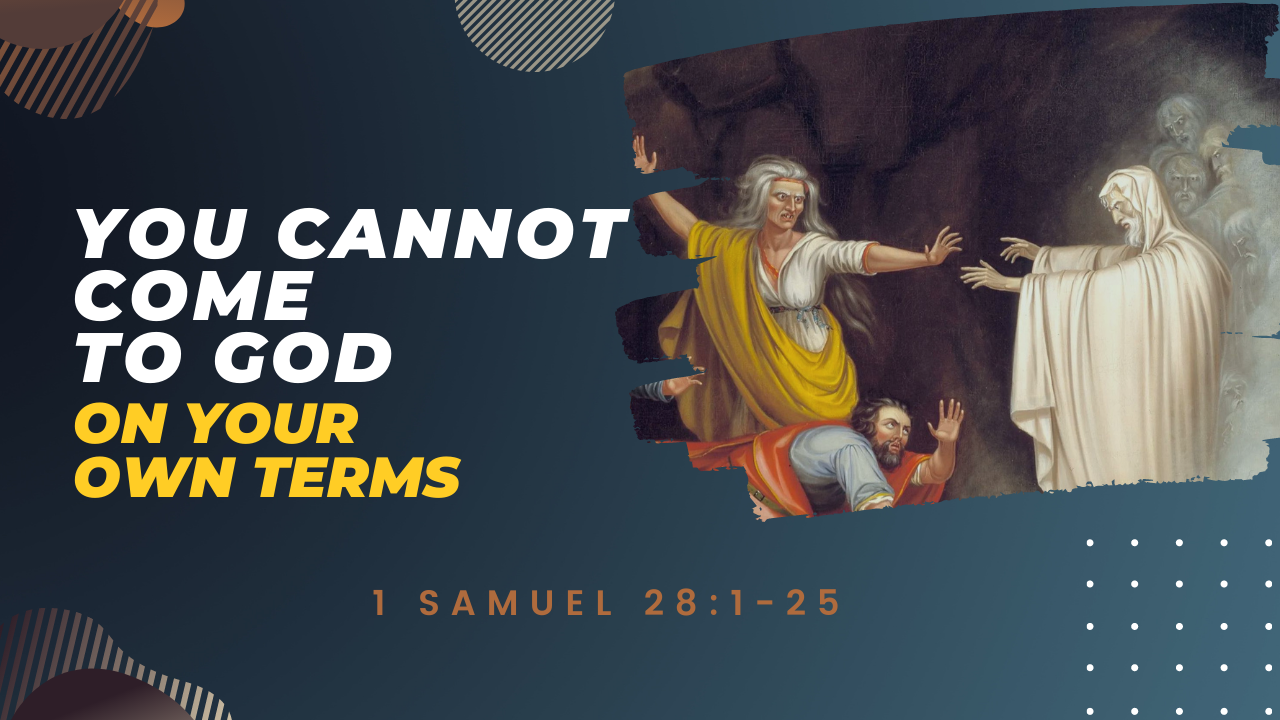1 Samuel 28
One of the most lamentable things about the contemporary American religious landscape is that faith is so often treated as a product that is peddled to consumers and not sincere faith in the God of the Bible. You can shut yourself off from what the Bible actually says and easily find some religious authority who will tell you everything you want to hear. Similarly, in 1 Samuel 28, King Saul had rejected God, God no longer spoke to him, and so, on the eve of Battle, Saul did what was punishable by death in consulting with mediums who would tell him what he wanted to hear. And in the very end, he found out what he needed to hear instead.
Catch the First Sermon in this series here.
Catch the Second Sermon in this series here.
Catch the Third Sermon in this series here.
Catch the Fourth Sermon in this series here.
Catch the Fifth Sermon in this series here.
Catch the Sixth Sermon in this series here.
Catch the Seventh Sermon in this series here.
28 Now it happened in those days that the Philistines gathered their armies together for war, to fight with Israel. And Achish said to David, “You assuredly know that you will go out with me to battle, you and your men.”
2 So David said to Achish, “Surely you know what your servant can do.”
And Achish said to David, “Therefore I will make you one of my chief guardians forever.”
3 Now Samuel had died, and all Israel had lamented for him and buried him in Ramah, in his own city. And Saul had put the mediums and the spiritists out of the land.
4 Then the Philistines gathered together, and came and encamped at Shunem. So Saul gathered all Israel together, and they encamped at Gilboa. 5 When Saul saw the army of the Philistines, he was afraid, and his heart trembled greatly. 6 And when Saul inquired of the Lord, the Lord did not answer him, either by dreams or by Urim or by the prophets.
7 Then Saul said to his servants, “Find me a woman who is a medium, that I may go to her and inquire of her.”
And his servants said to him, “In fact, there is a woman who is a medium at En Dor.”
8 So Saul disguised himself and put on other clothes, and he went, and two men with him; and they came to the woman by night. And he said, “Please conduct a séance for me, and bring up for me the one I shall name to you.”
9 Then the woman said to him, “Look, you know what Saul has done, how he has cut off the mediums and the spiritists from the land. Why then do you lay a snare for my life, to cause me to die?”
10 And Saul swore to her by the Lord, saying, “As the Lord lives, no punishment shall come upon you for this thing.”
11 Then the woman said, “Whom shall I bring up for you?”
And he said, “Bring up Samuel for me.”
12 When the woman saw Samuel, she cried out with a loud voice. And the woman spoke to Saul, saying, “Why have you deceived me? For you are Saul!”
13 And the king said to her, “Do not be afraid. What did you see?”
And the woman said to Saul, “I saw a spirit ascending out of the earth.”
14 So he said to her, “What is his form?”
And she said, “An old man is coming up, and he is covered with a mantle.” And Saul perceived that it was Samuel, and he stooped with his face to the ground and bowed down.
15 Now Samuel said to Saul, “Why have you disturbed me by bringing me up?”
And Saul answered, “I am deeply distressed; for the Philistines make war against me, and God has departed from me and does not answer me anymore, neither by prophets nor by dreams. Therefore I have called you, that you may reveal to me what I should do.”
16 Then Samuel said: “So why do you ask me, seeing the Lord has departed from you and has become your enemy? 17 And the Lord has done for Himself as He spoke by me. For the Lord has torn the kingdom out of your hand and given it to your neighbor, David. 18 Because you did not obey the voice of the Lord nor execute His fierce wrath upon Amalek, therefore the Lord has done this thing to you this day. 19 Moreover the Lord will also deliver Israel with you into the hand of the Philistines. And tomorrow you and your sons will be with me. The Lord will also deliver the army of Israel into the hand of the Philistines.”
20 Immediately Saul fell full length on the ground, and was dreadfully afraid because of the words of Samuel. And there was no strength in him, for he had eaten no food all day or all night.
21 And the woman came to Saul and saw that he was severely troubled, and said to him, “Look, your maidservant has obeyed your voice, and I have put my life in my hands and heeded the words which you spoke to me. 22 Now therefore, please, heed also the voice of your maidservant, and let me set a piece of bread before you; and eat, that you may have strength when you go on your way.”
23 But he refused and said, “I will not eat.”
So his servants, together with the woman, urged him; and he heeded their voice. Then he arose from the ground and sat on the bed. 24 Now the woman had a fatted calf in the house, and she hastened to kill it. And she took flour and kneaded it, and baked unleavened bread from it. 25 So she brought it before Saul and his servants, and they ate. Then they rose and went away that night.
1 Samuel 28:1-25
Introduction
After weeks of seeing the tests of a mature, wise, patient, and faithful king was put through to prove his worth, the very next scene in this story contrasts him with a wicked king who is about to meet his end. The focus has always been more on David and a positive view of righteous kingship, but here, we see a brief glimpse of sin taking control of a king’s life.
A Wicked King Seeks a Witch (28:1-19)
The chapter begins with the conclusion of the previous story. David is serving Achish of Gath, and now the Philistines are assembling an army for one final battle against Saul. The climactic scene is being set, and David is in a bind. He cannot fight Israel but is in the service of Achish. But before that conflict is resolved, we are taken back to Saul.
It begins by giving us some context. We are reminded that Samuel is dead and that Saul had acted as a faithful king and drove out all the witches from the land. The two points are very relevant to what happens later on. The Philistines had gathered their great army, and in response, Saul mustered all of Israel and gathered his own great army. As the two armies got within visual range of each other, Saul became very afraid at the sight of the Philistines. Take note of Saul’s reaction here. He was afraid. Saul’s fear is the theme of this chapter. Everywhere he goes, he is afraid. What is one reason he is afraid? He tries to get an answer from God as he used to, but God has been silent. He has not appeared to him in dreams, answered him via the priest’s Urim and Thummin (maybe he shouldn’t have killed all the priests?), and no prophets come to him. God is not speaking to him, and that makes Saul even more afraid.
So what does Saul do — accept that God is angry with him, repent, and accept God’s judgment? No, he instead tries to get an answer from God in the most roundabout way. He tells his servants to find him a witch. They do and take him to En Dor. And you will notice that Saul takes off his kingly robes and puts on other clothes. Does that have any meaning here? You bet it does. Saul is taking off his robe of authority, unwittingly admitting the kingdom is being taken from him.
Of course, the reason he does this is to trick the witch into bringing up Samuel from Sheol, which she would not have done had she recognized Saul (the penalty for witchcraft is death). So that night, Saul and two of his men greet her, and despite her initial hesitation, which Saul responds to with a blasphemous vow to Yahweh, she agrees to do it.
She asks Saul who he would like to bring up, and he tells her Samuel. After the woman did whatever incantations or magical practices to bring Samuel up, she at least saw him. And as she saw him, she cried out. And in her voice, she spoke to Saul because she had realized it was him and was upset she had been deceived. Saul tells her not to be afraid, and he asks her to describe what she sees. “A spirit ascending out of the earth,” was her answer. This provokes another question from Saul. “What is his form?” She described him as an old man covered with a mantle. From that description, Saul knew it was Samuel, and he bowed his face to the ground.
Then, it seems, Samuel spoke through the woman. Saul never actually sees Samuel’s spirit, just this witch. But the words very much were Samuel’s. His first question to Saul is, “why have you disturbed me?” Saul tells him that God has cut him off from all communication. Samuel’s response to this is blunt. “Why are you asking me then? God is not talking to you because you are His enemy. God is doing what He said He would do way back when you didn’t carry out the ban against the Amalekites. So, you and Israel are going to lose to the Philistines, and by this time tomorrow, you and your sons will be with me.”
There are a few things to clarify here. Where is Samuel at this point in the story? Is he in heaven? No, he is in Sheol. The New Testament calls this place Hades. Jesus, in one of his parables, describes it as the place of the dead, with one side for the faithful called Abraham’s bosom and the other a place of torment. The Greeks and Romans made a similar distinction in Hades, calling one side Elysium and the other Tartarus. When Samuel says that Saul and his sons would be with him the next day, Samuel did not mean Saul is going to heaven. Until Christ’s resurrection, no human flesh went up to heaven. In the Old Testament, when you died, believer and unbeliever alike, where did you go? You went down. Samuel was Sheol, and Saul and his sons were joining him there. Now, more specifically, Samuel was in Abraham’s bosom. Jonathan almost certainly joined him there. But Saul? Saul went where the rich man from the parable of the rich man and Lazarus went.
Demonic Passover (v. 20-25)
Saul’s reaction to all of this is to grieve and be filled with fear. His strength was gone, and he refused to eat. And this witch tries to get him to eat, but he refuses. It took Saul’s servants, along with the woman pleading with him, to get him to agree. The woman doesn’t just get him some food out of the pantry. She slaughters a fatted calf, kneads and bakes unleavened bread, and they ate and rose up and left.
Now, what does that sound like? Slaughtering an animal, eating unleavened bread, and getting up and leaving right after you eat it? It is Passover. We are supposed to be reminded of Passover here. This is a mock Passover. It is a meal with demons. And instead of being delivered, what is going to happen? The Destroyer is going to take Saul and his firstborn.
Conclusion
What does this story mean for us? It is to display for us the antithesis of a faithful king. Saul is consumed by fear. He fears everything. The Philistines. Samuel. Samuel’s words. What is the only thing he is not afraid of in this passage? God. He has no regard for Him at all. If he feared the Lord, He would not have consulted a witch, a crime so great the punishment is death. The fact that he would swear to the witch in Yahweh’s name is the most absurd part of this. “Please do this thing that Yahweh hates so much He says everyone who does it should die, oh and by the way in the name of Yahweh no harm will come to you.” The man has no regard for God or His Law, but is terrified of everything else.
That is the way the ungodly are. It is not as though the faithful man has no anxieties, no fears, or anything like that. We do. But what does God promises us? Perfect love casts out fear. Cast all your burdens upon me, says Jesus. We have fears and anxieties, but we know we belong to the Lord, and He bears them for us. Sometimes we struggle to put our worries in God’s care and leave it all up to Him, but it is just what Christians do.
But for those who do not know the Lord, there is nowhere for their fear to go. It consumes them. If there is no God above sovereign over all things, and you are at the mercy of random chance and impersonal laws of nature, all you have is the certainty of your own doom. That is what Saul was experiencing. Of course, Saul is not an atheist, and there is some kind of belief in God in there, though obviously not a saving faith. Saul is like most unbelievers, not hardened atheists, but people who believe in God enough to think they can game the system and hack their way into salvation on their own terms. He knows what God has said, He knows God has cut him off, but he thinks, “Ah, I know a way I can get around that. I’ll just consult a witch and figure out what I’ve gotta do.”
This is how unbelievers often are “yeah I believe in God. No, not enough to repent from my sins I really like, that’s like legalism man. Obeying God? That’s for Pharisees. I think God is love and you shouldn’t judge people.” What are they doing? They are acting the same way Saul is. There’s gotta be some way to be right with God without repentance. But that isn’t how it works. That way only leads to death. And that sin just piles up and up and up, leaving people in the same condition as Saul, totally wracked by fear and dread. The only way to avoid this is repentance and faith in Christ.
So the charge to you is this: look to God’s Word, take it seriously on its own terms, not on yours. What God says is sometimes going to conflict with what you want it to say. It is definitely going to conflict with what this insane world wants it to say. But trust Him and trust His Word and believe it. Don’t try to find a workaround like Saul. Just receive what God says and do it. Just receive His Word and believe. And as you believe, trust Him to take care of you and cast all your anxieties upon Him. In the Name of the Father, the Son, and the Holy Spirit. Amen!

Andrew Isker is the pastor of 4th Street Evangelical Church in Waseca, MN. He is a graduate of Minnesota State University and Greyfriar’s Hall Ministerial Training School, and he has served churches in Missouri, West Virginia, and Minnesota. He is the author (with Andrew Torba) of Christian Nationalism, and the author of the forthcoming book, The Boniface Option. Andrew, his wife Kara, and their five children reside in his hometown of Waseca, MN. He can be found on Gab @BonifaceOption.





